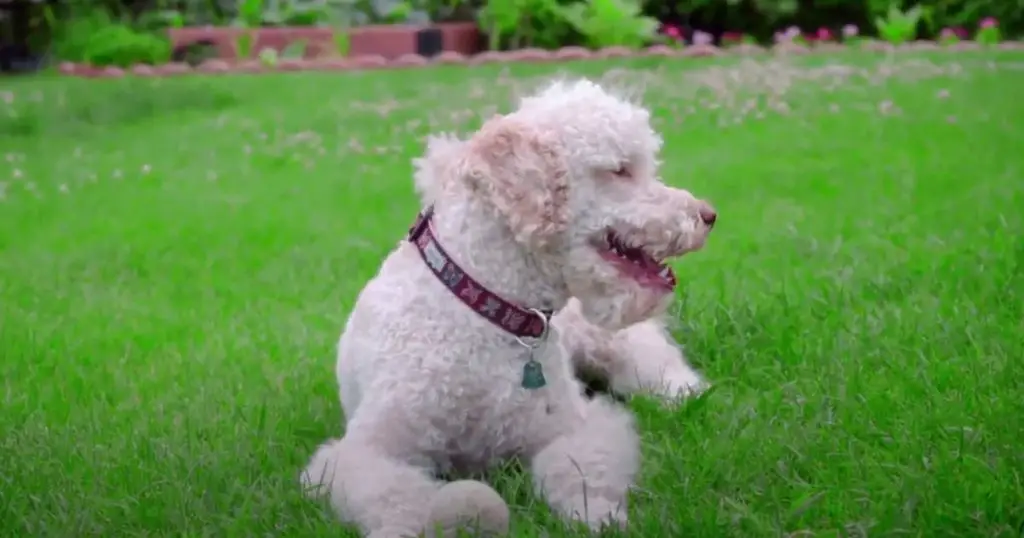
Are poodles stubborn? This is a question often asked by potential dog owners.
The answer is…
Poodles are not inherently stubborn but can be if they are not properly trained and socialized.
Poodles are highly intelligent dogs that require a great deal of mental stimulation. If a poodle is not given enough mental stimulation, they can become bored and destructive. Poodles need a firm but gentle hand when it comes to training.
You should approach each individual dog with an open mind and a willingness to work with them to achieve the desired behavior.
Are Poodles Stubborn by Nature?
Poodles are not inherently stubborn by nature, but they can become stubborn if they are not properly trained and socialized.
How do you deal with a stubborn Poodle?
There are several ways to deal with a stubborn poodle:
- Be consistent: Consistency is essential when it comes to training a stubborn poodle. Use the same commands and techniques every time you interact with your poodle. If you’re consistent, your poodle will learn what behavior is acceptable and what is not.
- Positive reinforcement training: One of the best ways to deal with a stubborn poodle is to use positive reinforcement training. Reward your poodle with treats, praise, and affection when they exhibit good behavior. This will encourage them to repeat the desired behavior.
- Exercise and mental stimulation: Poodles need plenty of exercise and mental stimulation to prevent boredom and destructive behavior. Take your poodle for daily walks, play games with them, and provide them with interactive toys.
- Seek professional help: If your poodle’s stubborn behavior persists, consider seeking the help of a professional dog trainer or behaviorist. They can help identify the underlying cause of the behavior and provide you with effective training techniques.
Standard Poodle Temperament
Poodles are intelligent, playful, and loving dogs. The standard poodle is the largest of the three varieties, and it is known for its elegant appearance and athleticism.
Poodles are one of the oldest dog breeds, with purebred poodles having been around since the 15th century.
The standard poodle’s temperament is typically more laid-back than that of smaller varieties, but they still require enough exercise and mental stimulation to be happy and well-behaved.
Miniature and Toy Poodle Temperament
Miniature and toy poodles share many traits with standard poodles, including their intelligence and affectionate nature.
However, smaller poodles tend to have a higher energy level and may bark more frequently.
Given their size, miniature and toy poodles have a reputation for being more stubborn than their larger counterparts.
This is more likely due to the natural temperament of smaller dogs rather than any inherent stubbornness in poodles as a breed.
Differences in Poodle Mix Breeds
Poodle mixes, such as the popular Labradoodle (Labrador Retriever and Poodle mix), combine the characteristics of both parent breeds, resulting in a unique temperament.
Poodle mixes often inherit the intelligence and trainability of the poodle but may also inherit the stubbornness or other personality traits from the other breed.
It’s essential to research and understand the temperament of both parent breeds when considering a mixed breed dog for adoption.
What Affects the Poodle’s Temperament and Personality?
Genetics and Breed Traits
While poodle temperament is shaped by genetics, other factors such as environmental and social influences can also play a role.
Some aspects of a poodle’s temperament, like intelligence and energy level, are innate and cannot be changed.
However, early socialization and the dog’s experiences can significantly affect their temperament as well.
Early Socialization in Poodles
Early socialization plays a crucial role in shaping a poodle’s temperament and personality.
Exposure to various people, animals, and environments from an early age can help develop a poodle’s confidence, making it less likely to be stubborn or fearful.
Lack of socialization early in a poodle’s life can make them more susceptible to behavioral issues in the future.
Environmental Factors
Environmental factors can also impact a poodle’s temperament. For example, a poodle that’s left alone for long periods may become bored and develop destructive behaviors.
Consistent exercise and mental stimulation are essential for helping a poodle maintain a well-adjusted temperament.
It’s vital to provide these daily activities to avoid developing stubborn or anxious behaviors.
How to Manage Poodle Temperament for Successful Training
Understanding Poodle Personality Traits
Understanding the common personality traits of poodles can be helpful in managing their temperament effectively.
Poodles are known for being intelligent, eager to please, and sociable, which can make training a more enjoyable process.
It’s essential to recognize your poodle’s individual traits and develop a tailored training plan to achieve the best results.
Trainability of Poodles
Poodles are highly trainable dogs, thanks to their intelligence and desire to please their owners.
Although they can be independent thinkers, poodles typically respond well to positive reinforcement training methods.
The key to training a poodle successfully is consistency, patience, and the use of rewards such as praise, treats, or toys.
Using Positive Reinforcement in Training
Positive reinforcement is an effective training method for poodles, as it helps to encourage desired behaviors without punishing undesirable actions.
Praises, treats, and toys can be used as rewards, while ignoring negative behavior or redirecting your poodle’s attention onto something else can help reduce stubbornness during the training process.
Poodle Puppy Temperament: What to Expect?
Choosing the Right Poodle Puppy
When selecting a poodle puppy, it’s important to consider temperament and personality.
Observing a prospective poodle puppy in various environments can help you gain a better understanding of their natural disposition.
A well-adjusted poodle puppy should be curious, friendly, and eager to explore its surroundings.
Instinctual Poodle Puppy Behaviors
Like all puppies, poodle puppies have instinctual behaviors, such as mouthing, chewing, barking, and play-fighting, which are typically harmless.
However, these behaviors can be overwhelming for some, and early training is essential in reinforcing good habits and discouraging unwanted behaviors.
Managing Puppy Energy Levels
Poodle puppies possess a significant amount of energy, which can sometimes be challenging to manage.
Incorporating regular exercise, playtime, and mental stimulation into your poodle puppy’s daily routine can help maintain a desirable temperament and prevent issues later in life.
How Poodle Temperament Affects Interaction with Others
Are Poodles Good with Children?
Poodles are generally good with children, as they are typically patient and gentle. However, it’s essential to supervise interactions, especially with smaller poodles, to avoid any accidents or misunderstandings.
All children should be taught how to appropriately handle and interact with dogs to maintain a positive relationship.
Poodle’s Behavior Around Strangers
Some poodles may be aloof or wary of strangers at first; however, they usually warm up quickly with proper introductions.
Early socialization can help reinforce positive encounters with strangers and increase their comfort level when meeting new people.
Compatibility with Other Pets
Poodles can get along well with other pets, especially when introduced early in life. With their friendly nature and adaptable temperament, poodles have been known to become great companions for other dogs, cats, and even smaller animals like birds or rabbits.
FAQS
Are poodles disobedient?
Poodles can be disobedient if they are not properly trained and socialized. However, poodles are generally intelligent and eager to please their owners, making them easy to train with positive reinforcement techniques.
It is important to start training poodles at a young age and to be consistent with the training to avoid disobedience.
Additionally, disobedience can be a sign of underlying health or behavioral issues that should be addressed by a veterinarian or professional dog trainer (source: PetMD).
